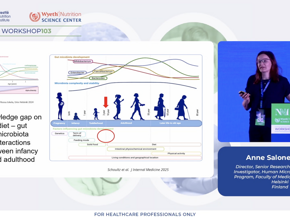Infants born to overweight or obese mothers
Infants born to overweight/obese mothers show accelerated growth during the first year of life even when breastfed and fast growth is known to be an antecedent of later obesity.
Fast Growth of Infants of Overweight Mothers:
Can It Be Slowed Down?
By Ferdinand Haschke, et al.
Key insights
Infants born to overweight or obese mothers show accelerated growth during the first year of life even when breastfed. The effect of maternal obesity is most marked during the first six months after birth, coinciding with the time when breast milk provides the majority of nutrients. This suggests that the effect of maternal obesity is mediated through the composition or amount of breast milk. Traditional formulas for infants older than three months of age contain unnecessarily high amounts of protein. Formulas with low protein content, closer to that of breast milk, may slow down the growth of infants of overweight or obese mothers, reducing the risk of future obesity.
Breastfeeding may exert its protective effect against later obesity by slowing growth and diminishing adiposity during infancy. Since growth during infancy has a potentially large impact on long-term health, it is important to understand the factors that influence growth in infancy. This article pools the data from three recent studies in order to determine whether there is an effect of maternal overweight/obesity on infant growth, and whether low formula protein content affects infant growth.
Practical implications
Infants born to and breastfed by overweight or obese mothers were larger than the benchmark WHO standards. Weight gain of breastfed infants was significantlly higher if the mothers were overweight or obese. In formula-fed infants, the protein concentration of infant formulas had a significant influence on weight gain in the first year of life. Infants fed low-protein formulas still showed lower weight gain than infants fed high protein formula.
Reducing the protein content in formulas for infants beyond three to four months of age should be an industry goal.
Recommended reading
Martin F, Moco S, Montoliu I, et al: ‘Impact of breast-feeding and high- and low-protein formula on the metabolism and growth of infants from overweight and obese mothers.’ Pediatr Res: 2014; 75:535–543.
If you liked this post you may also like



